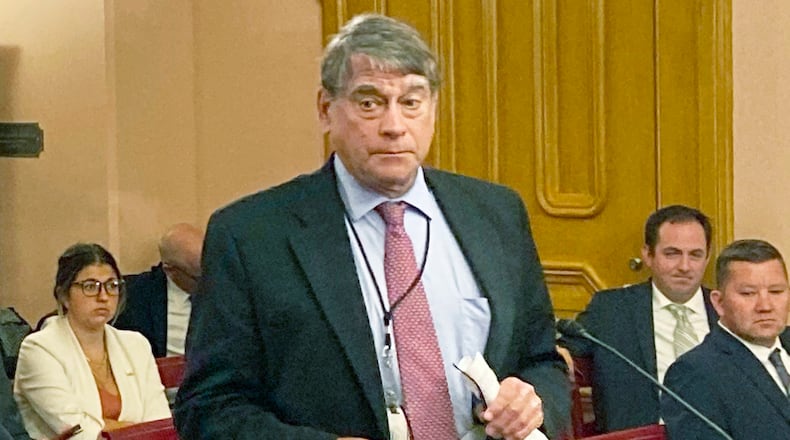During Thursday’s brief hearing, Seitz made two amendments to his bill. One fixed a discrepancy in absentee ballot application deadlines pointed out by the League of Women Voters, he said: now the proposed deadline for requesting an absentee ballot either online or in writing will be seven days before an election.
The other amendment, in response to election officials’ comments, leaves current law in place to allow the secretary of state’s office to mail absentee ballot applications to all registered voters in general election years, so long as the General Assembly appropriates funds for that purpose, Seitz said. Previously his bill would have eliminated that practice.
The original bill would have allowed automatic voter registration through the Bureau of Motor Vehicles, as 22 other states already do; but Seitz said that got cut out because Senate leaders don’t yet “feel comfortable” with it.
He and Ray introduced the bill in May, with a substitute bill filed in November. Many changes proposed in the latest version are minor, but significant ones include:
· A requirement that driver’s licenses and state ID cards issued to noncitizens must indicate that person’s noncitizen status, in line with a state constitutional amendment passed Nov. 8 barring noncitizens from voting in any Ohio election.
· Eliminating the last day of early in-person voting, the Monday before Election Day; but adding an equal number of hours to early voting during the previous week.
· Allowing absentee ballots to be returned to drop boxes from the day after voter registration ends until polls close on Election Day.
· Limiting ballot drop boxes to three per county, all at the same location: the county board of elections office.
· Keeping those drop boxes under constant video surveillance, and allowing only bipartisan teams to open them.
· Prohibiting August special elections – such as the primary for state House and Senate this year – except for a few special circumstances.
· Appropriating $7.5 million to buy electronic pollbooks.
Although the bill would allow Ohioans to submit absentee ballot requests online, the ballots themselves would still be mailed to the voter in paper form, which has to be mailed back or returned in person to county election offices.
Every registered voter has gotten an absentee ballot application in the mail since 2012 from the Ohio secretary of state. That was roughly 8 million applications for the Nov. 8 election.
In a committee hearing Nov. 17, voting rights groups said the long list of changes would confuse voters and make it harder for some to vote, especially the elderly and disabled.
This week a group of Ohio religious leaders spoke out against the bill in a news release, saying it will make voting harder by limiting early voting and ballot drop boxes.
“Substitute House Bill 294 is a poor solution to a problem that doesn’t exist,” said Carl Ruby pastor of Central Christian Church in Springfield. “With no evidence of voter fraud, the only thing HB 294 will accomplish for Ohioans is to make it harder for them to exercise their right to vote.”
“We need to support the ability of all citizens to vote, including those of us with mobility and health constraints or working two or three jobs to make ends meet,” said the Rev. Joan VanBecelaere of Unitarian Universalist Justice Ohio. “We have to enable those without permanent homes, those serving in the military or attending school or traveling for work to vote and have their voices heard, too. But HB 294 would make it more difficult for all of these, our neighbors, to vote by creating a host of confusing new regulations and deadlines. It would even eliminate simple curbside voting for those of us with mobility or health issues.”
If backers can’t steer the bill out of the House committee and a to a floor vote, then through the same process in the Senate within the next three weeks – even as legislators consider dozens of other bills during the lame-duck session – it would have to be re-filed and start all over when the 135th General Assembly convenes in January.
About the Author

